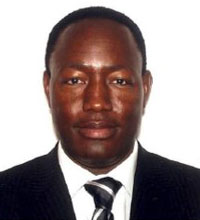Cecilia Jamasmie | November 5, 2021

Siguiri gold mine is AngloGold’s only operation in Guinea. (Image courtesy of AngloGold Ashanti.)
Guinea’s junta has appointed Moussa Magassouba, the director general of AngloGold Ashanti’s (JSE: ANG) (NYSE: AU) local subsidiary as the country’s mines and geology minister, two months after the army unit overthrew President Alpha Conde.

Magassouba, a western educated mining engineer and fluent English speaker, has more than 20 years’ of experience in the industry. He joined AngloGold Guinea in 2016 and held the role of managing director.
Experts, such as Eric Humphery-Smith, Africa analyst at risk consultancy Verisk Maplecroft, believe Magassouba’s nomination is a positive step towards putting mining executives’ minds to rest.

Moussa Magassouba. (Image: Siguiri mine.)
“The fact that Magassouba is a pure technocrat, with no obvious political experience, is reassuring for operators,” Humphery-Smith wrote. “It also proves that the National Rallying Committee for Development (CNRD) — one of the four institutions or figures in charge of the transition — is attentive to industry stakeholders.”
Abé Sylla, a United States-based businessman, has been appointed as energy and hydrocarbons minister, while artist Alpha Soumah was named culture minister.
Guinea is the world’s top exporter of bauxite, which is refined into alumina and then smelted to produce aluminum. The reddish ore accounts for most of the West African nation’s mining exports, though the country also has vast deposits of iron ore, gold and diamonds.
While the coup has been condemned by Guinea’s neighbours and exacerbated concerns about supply constraints that pushed aluminum prices to the highest level in 13 years, the junta took early steps to reassure miners.
One of its first actions was to lift a curfew in mining areas, urging companies to keep operating and keeping the nation’s ports open.
The junta also unveiled a “transitional charter” that it says will steer the country back to civilian rule.
Apolitical
Magassouba’s job will be specially challenging, Humphery-Smith says, due mainly to his lack of experience in politics.
“The largely apolitical nature of Magassouba’s profile means we expect him to give way to the junta’s policy directives. Indeed, the Transition Charter makes it explicitly clear that Doumbouya and the CNRD will instruct the government on policy matters,” the Verisk Maplecroft analyst says.
The expert notes the junta’s slow decision-making pace to date, hints that the government will not be “especially responsive” to the private sector.
Besides Australia, Guinea is one of China’s largest supplier of bauxite. Yet poverty remains endemic as the ore is sent as raw material, with little effort made so far to transform it locally.
The country’s new leadership has said its focus will be to accelerate the second phase of the mining value chain by boosting local processing.
Leaders of the 15-nation regional bloc Economic Community of West African States (ECOWAS), from which Guinea is currently suspended, meet on Sunday to discuss the situation in the country as well as in neighbouring Mali, where a junta took power last year.
ECOWAS has demanded that the Guinea junta organize elections by the end of March 2022.
“The fact that Magassouba is a pure technocrat, with no obvious political experience, is reassuring for operators,” Humphery-Smith wrote. “It also proves that the National Rallying Committee for Development (CNRD) — one of the four institutions or figures in charge of the transition — is attentive to industry stakeholders.”
Abé Sylla, a United States-based businessman, has been appointed as energy and hydrocarbons minister, while artist Alpha Soumah was named culture minister.
Guinea is the world’s top exporter of bauxite, which is refined into alumina and then smelted to produce aluminum. The reddish ore accounts for most of the West African nation’s mining exports, though the country also has vast deposits of iron ore, gold and diamonds.
While the coup has been condemned by Guinea’s neighbours and exacerbated concerns about supply constraints that pushed aluminum prices to the highest level in 13 years, the junta took early steps to reassure miners.
One of its first actions was to lift a curfew in mining areas, urging companies to keep operating and keeping the nation’s ports open.
The junta also unveiled a “transitional charter” that it says will steer the country back to civilian rule.
Apolitical
Magassouba’s job will be specially challenging, Humphery-Smith says, due mainly to his lack of experience in politics.
“The largely apolitical nature of Magassouba’s profile means we expect him to give way to the junta’s policy directives. Indeed, the Transition Charter makes it explicitly clear that Doumbouya and the CNRD will instruct the government on policy matters,” the Verisk Maplecroft analyst says.
The expert notes the junta’s slow decision-making pace to date, hints that the government will not be “especially responsive” to the private sector.
Besides Australia, Guinea is one of China’s largest supplier of bauxite. Yet poverty remains endemic as the ore is sent as raw material, with little effort made so far to transform it locally.
The country’s new leadership has said its focus will be to accelerate the second phase of the mining value chain by boosting local processing.
Leaders of the 15-nation regional bloc Economic Community of West African States (ECOWAS), from which Guinea is currently suspended, meet on Sunday to discuss the situation in the country as well as in neighbouring Mali, where a junta took power last year.
ECOWAS has demanded that the Guinea junta organize elections by the end of March 2022.
No comments:
Post a Comment